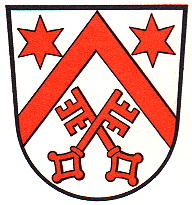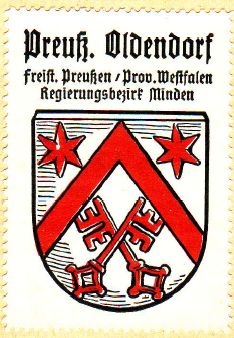Preussisch Oldendorf: Difference between revisions
Knorrepoes (talk | contribs) m (Text replacement - "{{de}}" to "") |
Knorrepoes (talk | contribs) m (Text replacement - "{| class="wikitable"↵|+Official blazon↵|-↵|'''German'''↵| ↵|-↵|'''English''' ↵| {{blazon wanted}}↵|}" to "{| class="wikitable" |+Official blazon |- |'''German''' | blazon wanted |- |'''English''' | blazon wanted |}") |
||
| Line 13: | Line 13: | ||
|- | |- | ||
|'''German''' | |'''German''' | ||
| | | blazon wanted | ||
|- | |- | ||
|'''English''' | |'''English''' | ||
| | | blazon wanted | ||
|} | |} | ||
Revision as of 08:34, 6 April 2023
PREUSSISCH OLDENDORF
State : Nordrhein-Westfalen
District (Kreis) : Minden-Lübbecke (until 1972 Lübbecke)
Additions: 1973 Amt Preußisch Oldendorf, Börninghausen, Engershausen, Getmold, Harlinghausen, Hedem, Holzhausen, Lashorst, Offelten, Schröttinghausen
| German | blazon wanted |
| English | blazon wanted |
Origin/meaning
Oreussisch Oldendrof received city right sin 1719 from King Friedrich Wilhelm I of Prussia. The area at the time belonged to the County Ravensberg and the oldest seals thus showed the arms of Ravensberg (three chevrons). On February 25, 1910 the present arms were granted and show only a single chevron for Ravensberg. The two keys symbolise the diocese of Minden, to which the parish belongs. The two stars are most likely derived from the arms of Lübbecke.
| The arms by Hupp in the Kaffee Hag albums +/- 1925 |
Literature: Stadler, 1964-1971, 8 volumes.

